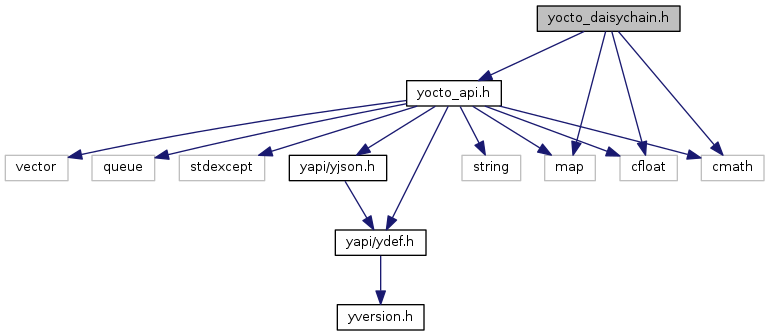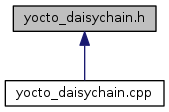

Go to the source code of this file.
Classes | |
| class | YDaisyChain |
Macros | |
| #define | _Y_DAISYSTATE_ENUM |
| #define | Y_CHILDCOUNT_INVALID (YAPI_INVALID_UINT) |
| #define | Y_REQUIREDCHILDCOUNT_INVALID (YAPI_INVALID_UINT) |
Typedefs | |
| typedef void(* | YDaisyChainValueCallback) (YDaisyChain *func, const string &functionValue) |
Enumerations | |
| enum | Y_DAISYSTATE_enum { Y_DAISYSTATE_READY = 0, Y_DAISYSTATE_IS_CHILD = 1, Y_DAISYSTATE_FIRMWARE_MISMATCH = 2, Y_DAISYSTATE_CHILD_MISSING = 3, Y_DAISYSTATE_CHILD_LOST = 4, Y_DAISYSTATE_INVALID = -1 } |
Functions | |
| YDaisyChain * | yFindDaisyChain (const string &func) |
| YDaisyChain * | yFirstDaisyChain (void) |
Macro Definition Documentation
| #define _Y_DAISYSTATE_ENUM |
Definition at line 56 of file yocto_daisychain.h.
| #define Y_CHILDCOUNT_INVALID (YAPI_INVALID_UINT) |
Definition at line 66 of file yocto_daisychain.h.
| #define Y_REQUIREDCHILDCOUNT_INVALID (YAPI_INVALID_UINT) |
Definition at line 67 of file yocto_daisychain.h.
Typedef Documentation
| typedef void(* YDaisyChainValueCallback) (YDaisyChain *func, const string &functionValue) |
Definition at line 54 of file yocto_daisychain.h.
Enumeration Type Documentation
| enum Y_DAISYSTATE_enum |
| Enumerator | |
|---|---|
| Y_DAISYSTATE_READY | |
| Y_DAISYSTATE_IS_CHILD | |
| Y_DAISYSTATE_FIRMWARE_MISMATCH | |
| Y_DAISYSTATE_CHILD_MISSING | |
| Y_DAISYSTATE_CHILD_LOST | |
| Y_DAISYSTATE_INVALID | |
Definition at line 57 of file yocto_daisychain.h.
Function Documentation
|
inline |
Retrieves a module chain for a given identifier. The identifier can be specified using several formats:
- FunctionLogicalName
- ModuleSerialNumber.FunctionIdentifier
- ModuleSerialNumber.FunctionLogicalName
- ModuleLogicalName.FunctionIdentifier
- ModuleLogicalName.FunctionLogicalName
This function does not require that the module chain is online at the time it is invoked. The returned object is nevertheless valid. Use the method YDaisyChain.isOnline() to test if the module chain is indeed online at a given time. In case of ambiguity when looking for a module chain by logical name, no error is notified: the first instance found is returned. The search is performed first by hardware name, then by logical name.
If a call to this object's is_online() method returns FALSE although you are certain that the matching device is plugged, make sure that you did call registerHub() at application initialization time.
- Parameters
-
func : a string that uniquely characterizes the module chain
- Returns
- a YDaisyChain object allowing you to drive the module chain.
Definition at line 275 of file yocto_daisychain.h.
|
inline |
Starts the enumeration of module chains currently accessible. Use the method YDaisyChain.nextDaisyChain() to iterate on next module chains.
- Returns
- a pointer to a YDaisyChain object, corresponding to the first module chain currently online, or a NULL pointer if there are none.
Definition at line 286 of file yocto_daisychain.h.